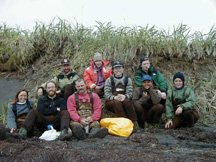
The Teachers Experiencing Antarctica (TEA) program, which began in 1992, evolved into the Teachers Experiencing Antarctica and the Arctic (TEA) program in 1995 with its first teacher, Tim Buckley, sent to the Arctic. The program objectives have remained focused on infusing high school classrooms with knowledge and appreciation of scientific research in the polar regions. The prerequisite for students participating in TEArctic was previous participation in the National Science Foundation's Young Scholars Program. Originally, students were assisting on research projects in Antarctica through the Young Scholars Program. Eventually, the potential for high school teachers to share their knowledge and experience in Antarctic research with large audiences became apparent and teachers took the place of students, inaugurating TEAntarctica. Currently discontinued, the Young Scholars Program selected outstanding students to work with principal investigators (PIs) in ongoing scientific research projects. TEArctic has included students since 1997.
Goals of Student Participation in Arctic Research Experiences
The goals of student participation in Arctic Research Experiences are an amalgam of the goals of the National Science Foundation's Young Scholars and TEA programs.
The Young Scholars Program strongly emphasizes student participation in the process of scientific discovery through interaction with practicing scientists in the laboratory and in the field. Projects offer a combination of instruction and problem solving activities, along with discussions of career preparation and science ethics. The projects focus on a variety of disciplines, including mathematics, computer science, engineering, chemistry, life science, physics, and earth sciences.
The goals of TEA are:
- to immerse teachers in a research experience as a component of their continued professional development;
- to have the polar research experience infused into the classroom in rich, engaging, and innovative ways that underscore the relevance and connected-ness of science and the scientific process to society and individuals; and
- to establish a growing, collaborative Polar Learning Community of teachers, students, school districts, researchers, and the community to build on the TEA experience.
Student Eligibility
Participation in the Young Scholars Program was required for students applying to participate in the TEA program. The application included an essay, academic transcripts, and two letters of recommendation. Applicants were also required to be in good physical condition and capable of strenuous exercise, air travel, and living and working cheerfully with others in rugged conditions.
Student Responsibilities
Each student working in the Arctic kept a daily journal while on expedition to the Arctic. At the end of the field component, the students submitted an essay of 2-4 pages describing the aspects of their experience that were particularly influential on their perceptions of science, research, the Arctic, the environment, people, or themselves.
